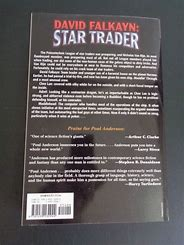Saturday, 3 February 2018
Law In Space?
David Falkayn says:
"'We're also violating law, but that can be winked at if we're well beyond civilization...'" (Chapter XVII, p. 504) (For full reference, see here.)
Can it? Who is winking at it? The police on any civilized planet cannot possibly know what Falkayn and Chee Lan are doing near Beta Crucis and have no reason to investigate the matter in any case. It means that Falkayn and Chee Lan are free to judge what they should do and they have civilized motives. However, we know that some other Polesotechnic League companies interpret the freedom of interstellar space as license to enslave, exploit, profiteer etc. Although Falkayn will do his best to counteract the most destructive consequences of League recklessness, the writing is on the wall for his whole civilization.
Subscribe to:
Post Comments (Atom)

7 comments:
Kaor, Paul!
It seems reasonable to think that only an INTERSTELLAR state, with a sovereign jurisdiction spreading over light years and parsecs, can logically enforce a truly interstellar code of law (however much it may vary from realm to realm). Which is what we later see the Terran Empire (and its neighbors) doing.
Sean
There used to be a notional line down the middle of the Atlantic. In the 16th century and on to the early 18th, there was a convention of "no peace beyond the Line" -- that is, deeds done west of the line didn't affect relations in Europe, and treaties made in Europe didn't apply west of it.
It was also put as "No law beyond the Line".
Hence the pirates and buccaneers who swarmed to the New World.
Dear Mr. Stirling,
But I think that situation ended after the War of the Spanish Succession if I'm correct in what I recall. That is, the belligerents on both sides agreed they would no longer tolerate these pirates, that enough was enough, they would cooperate in stamping them out.
Sean
Yup, but that was due to changed circumstances, not morals. The rise of large national armed forces made buccaneers less necessary as auxiliaries, Spain became less dominant, and so forth.
Buccaneers gave England (and France) "plausible deniability" in their relations with Spain; they could be disavowed, while conducting a seagoing guerilla war that protected the North Europeans' settlements in the New World -- over which Spain and Portugal claimed exclusive rights.
Most of the first English colonies in the mainland of the New World were initially planned as corsair bases for raids against Spanish commerce and settlements; they wanted places far enough north to be hard for the Spanish to get at, but far enough south that they'd be well-placed for raiding convoys. The settlement aspect was to make them self-sufficient and self-defending, but the main aim was piratical.
(For reasons of wind and current patterns, Spanish ships on their way back to Europe usually went fairly far up the coast of North America before turning east.)
This put Roanoke and Jamestown in what were pestilential areas for Europeans; the settlements from Pennsylvania north were better suited to European crops and had a better disease environment, but they were only developed later, when colonization for its own sake was the driving motive.
Dear Mr. Stirling,
Again, I agree. It was only for reasons of realpolitik that all the powers involved came to agree on the need for getting rid of the pirates after about 1713.
Sean
Suppressing piracy had very substantial economic benefits, and not just directly.
It wasn't that pirates seized a large percentage of ships, but the chance that they might meant higher insurance costs, and bigger crews and expensive cannon.
When European ships in the Atlantic basin could stop going armed, that alone cut costs by about a third.
(The Mediterranean remained dangerous far longer because of the Barbary Corsairs, not really totally suppressed until France conquered North Africa.)
Dear Mr. Stirling,
But the Muslim pirates of North Africa also preyed on shipping in the Atlantic as well, I think. I recall reading of how the merchant ships of the early US, no longer protected by the Royal Navy, often fell prey to the Barbary Corsairs. It wasn't till Thomas Jefferson fought a war with the Barbary states that they grudgingly agreed to leave US ships alone. But, as you said, the danger remained till Charles X's conquest of Algiers.
Sean
Post a Comment